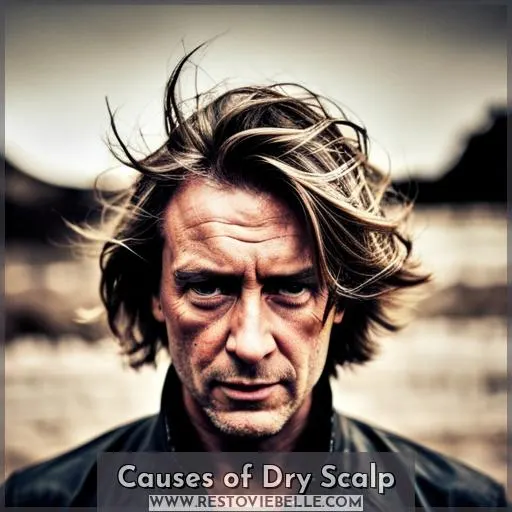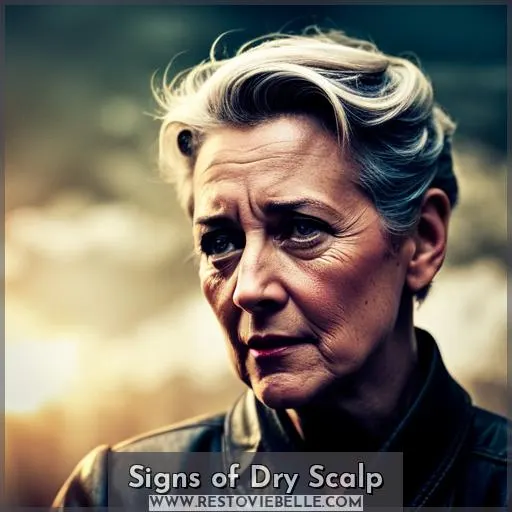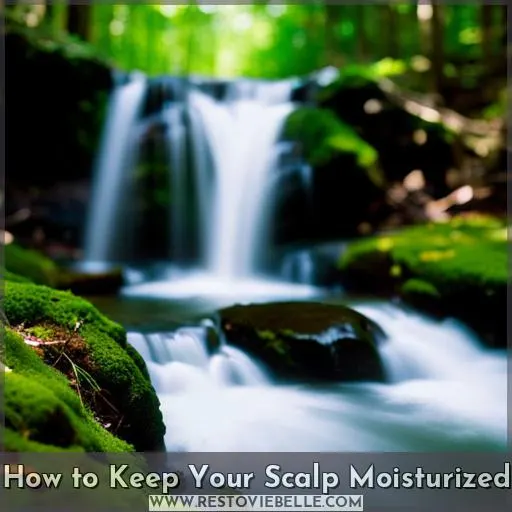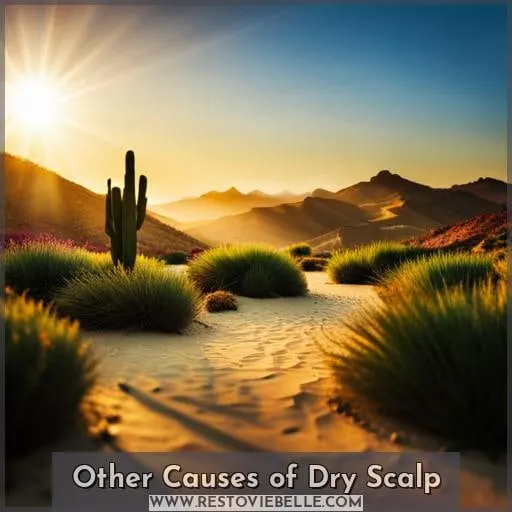This site is supported by our readers. We may earn a commission, at no cost to you, if you purchase through links.
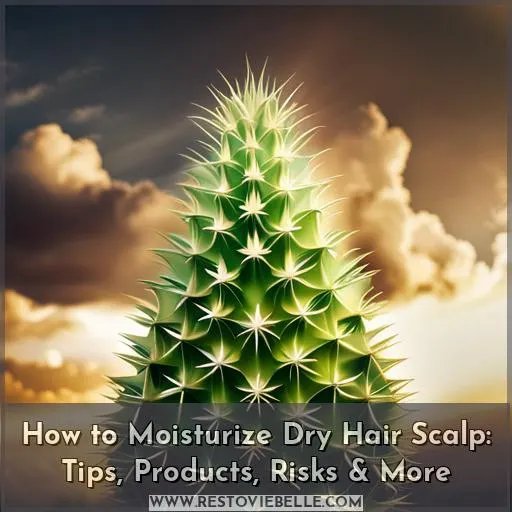 Do you suffer from a dry scalp? Itchy, flaky skin that is irritated and sore can be an embarrassing problem. If left untreated, dry scalp can worsen and cause hair loss or other serious issues like dermatitis or psoriasis.
Do you suffer from a dry scalp? Itchy, flaky skin that is irritated and sore can be an embarrassing problem. If left untreated, dry scalp can worsen and cause hair loss or other serious issues like dermatitis or psoriasis.
Understanding the causes of a dry scalp and learning how to moisturize it correctly are essential steps for restoring your hair’s health.
In this article, we will discuss the signs of a dry scalp as well as provide tips on how to keep your head moisturized with shampoos and oils so that you can have healthy locks once again! We’ll also cover any risks associated with trying these methods at home so that you feel confident in taking care of yourself without fear.
Table Of Contents
Causes of Dry Scalp
You could be suffering from dry scalp due to a variety of reasons, such as an imbalance in your natural microbiome or even weather changes. Cold temperatures and hot showers can strip away the natural oils that are essential for scalp health, while harsh shampoos may lead to increased dryness and flakiness.
Heat styling is another common culprit behind dehydrated scalps, as well as genetics or nutritional deficiencies.
To restore balance, it’s important to firstly identify what is causing your symptoms so you can properly address them with tailored solutions for optimal results.
Signs of Dry Scalp
Recognizing the tell-tale signs of a dry scalp is key to preventing further discomfort. Itchy, redness, and flakiness are symptoms that can indicate issues with sebum production or an allergy. Heat styling, cold weather, and harsh shampoos may also lead to a tight feeling on the scalp.
Dry hair, along with seasonal variations, can be another indication of insufficient moisture in the scalp area.
Scalp massage using hydrating oils mixed with a vitamin B3 complex and hyaluronic acid can help treat dryness caused by heat styling or genetic factors, as well as improve blood flow for increased nourishment of hair follicles, leading to better overall health for your tresses! Gentle scrubs, such as aloe vera, combined with sulfate-free products like triple detox shampoo, will also provide essential hydration while avoiding over-cleansing, which could affect the natural oil balance within your locks, making them more prone to damage from environmental stressors such as sun exposure.
To ensure optimal protection against these elements, consider applying protective measures before venturing out into extreme temperatures or humidity levels!
How to Keep Your Scalp Moisturized
Moisturizing your scalp is essential for maintaining a healthy balance of oil and preventing dryness, flakiness, and irritation. Choosing the right products to moisturize your scalp can help you achieve optimal hair health.
Shampoos with natural oils are important for replenishing moisture levels, while shampoos containing zinc pyrithione benefit both oily or dandruff-prone scalps. Applying serums, lotions, or even aloe vera gel as part of an exfoliation routine will also keep your scalp nourished and hydrated.
Tailoring this routine to suit individual needs is key to achieving desired results.
Choosing the Right Products to Moisturize Your Scalp
When it comes to hydrating your scalp, opt for shampoos and conditioners free of sulfates. Consider a shampoo with zinc pyrithione and use serums or oils specifically made for the scalp. For tailored solutions, consider professional assistance – massage brushes boost circulation and enhance hair growth while essential oils nourish the skin beneath your mane! Scalp exfoliation removes buildup while oil balances natural hydration; choose heat protection products that suit your hair type.
Applying Shampoos to Moisturize Your Scalp
To keep your scalp healthy, choose a shampoo specifically tailored to hydrate and protect. Deep conditioning treatments are great for dry scalps, as they provide intense moisture without stripping away natural oils.
Scalp massage with moisturizing masks can help boost circulation and improve hair growth.
Sulfate-free shampoos are gentler on the scalp than traditional detergent ones, while tea tree oil aids in reducing irritation or inflammation associated with dandruff or psoriasis. Leave-in products may be used sparingly to avoid product build-up; however, these should be avoided if you have extremely oily hair types as this could lead to further grease accumulation on the scalp’s surface area.
Regular use of hydrating shampoos helps retain essential moisture levels necessary for healthier-looking locks – no matter what type of tresses you possess!
Applying Shampoos and Oils to Moisturize Your Scalp
Indulge your scalp with a nourishing blend of shampoos and oils for optimal hydration. Balance sebum production, soothe inflammation, and reduce dandruff through oil treatments like tea tree, jojoba, or olive oil.
Gentle exfoliation helps remove buildup while strategic moisturizing protects against damage by environmental factors like heat styling or cold weather. Coconut oil is an ideal option for dry hair due to its high fatty acid content, which aids in restoring moisture levels as well as softening the strands.
Unwind after a stressful day using calming lavender oils that provide rejuvenation to both mind and body while also locking in essential nutrients into the scalp!
Risks and Side Effects of Scalp Moisturization
It’s important to be aware of the potential risks and side effects that can come with moisturizing your scalp, like skin irritation or over-stripping natural oils. To prevent these issues, choose a shampoo without harsh chemicals such as sulfates, which strip away essential natural oils from the scalp.
Exfoliate using gentle techniques such as salicylic acid and avocado oil. These help remove buildup while providing moisture at the same time!
Massage your scalp with an appropriate oil when heat styling hair – this will reduce damage caused by hot tools and relieve inflammation in sensitive areas.
Try applying a damp towel to your head after showering – this locks in hydration for longer lasting results!
Finally, don’t forget regular break days from products; allow your hair some time off so it can naturally balance itself out again! Allowing yourself adequate rest is key for healthy-looking tresses and scalps alike.
And always remember that prevention is better than cure when it comes to any kind of health condition-related treatments.
Dermatitis, Scalp Psoriasis, and Dandruff
Experiencing skin issues such as dermatitis, scalp psoriasis, and dandruff? These conditions can be caused by a staphylococcal infection or an imbalance in the oil balance of the scalp.
To avoid these problems, it’s important to maintain proper hydration levels for your scalp while also preventing dehydration when styling your hair. Treatment options depend on which condition you have. Eczema may require topical steroids, whereas psoriasis often requires antifungal shampoo therapy along with medications that reduce inflammation.
Dandruff usually responds well to over-the-counter shampoos containing active ingredients like zinc pyrithione or selenium sulfide.
When dealing with more severe cases of scalp psoriasis, treatment from a dermatologist may be necessary. This can include prescription medicated shampoos and other topical treatments like cortisone creams or ointments that contain coal tar extracts or salicylic acid derivatives.
These treatments help control symptoms associated with these conditions, such as itching and irritation due to dryness, while promoting a healthy oil balance in your scalp.
Other Causes of Dry Scalp
You may be dealing with a dry scalp due to other factors such as microbiome imbalance, harsh shampoos, heat styling, or nutritional deficiency. Signs of this condition include itchiness, redness, and flakiness. To combat these issues, consider using hydrating shampoo and conditioner along with treatments containing vitamin B3 complex and hyaluronic acid, as well as natural oils like jojoba or lavender for fine hair types.
Additionally, try exfoliating with gentle scrubs or vinegar. Follow this by massaging your scalp and oiling to enhance blood flow while also protecting the roots from further damage.
Frequently Asked Questions (FAQs)
What are the best hair products for dry scalp?
Hydrate and protect your scalp with sulfate-free products, customized for your hair type. Consider treatments containing a vitamin B3 complex and hyaluronic acid. Use natural oils sparingly to avoid allergens.
What kind of lifestyle changes should I make to prevent dry scalp?
To prevent dry scalp, lifestyle changes such as using hydrating shampoos and conditioners, avoiding harsh products and heat styling tools, opting for protective measures like oiling your scalp regularly can help.
Massages with vitamin B3 complex serums or aloe vera may also be beneficial. Consult a dermatologist if needed.
Are there any home remedies I can use to moisturize my scalp?
Yes! Try natural oils, scalp massage, aloe vera, gentle exfoliation, and tailored products for your hair type. Hydrate with hydrating shampoos and conditioners that are sulfate-free. Balance natural oils through oiling or dry shampooing to reduce breakage and maintain pH levels.
How often should I moisturize my scalp?
To maintain optimal scalp health, you should moisturize your scalp at least once a week. Utilize hydrating products and natural oils to achieve maximum hydration; try massages for enhanced circulation.
Is dry scalp contagious?
No, dry scalp is not contagious. It can be due to a variety of factors, such as environmental conditions and genetics.
Conclusion
Overall, scalp health is a key factor in the health of your hair. Moisturizing your dry scalp and hair is essential to maintain healthy hair. With the right techniques and products, you can keep your scalp hydrated and your hair looking its best.
To get the most out of moisturizing your dry hair and scalp, choose shampoos, conditioners, and oils that are specifically tailored to your hair type and needs. If you’re unsure of what products are best for your scalp, consult a dermatologist.
Additionally, scalp massages, exfoliation, and oiling can help to maintain moisture and protect hair from dryness. With a little effort and the right knowledge, you can have the healthy, hydrated scalp and hair you desire.
